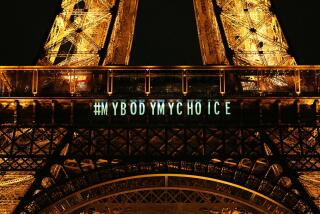Can Women Be Saints in France? : A push to enter Marie Curie, radioactivity co-discoverer, in the Pantheon
- Share via
When it comes to language, food and cultural patrimony, few nationalities are more inward-looking and resistant to change than the French. So it is unsurprising that in the two centuries since the Pantheon in Paris was dedicated during the French Revolution “Aux Grand Hommes la Patrie reconnaissante,” it has served as the mausoleum only for those great men, men to whom the fatherland was grateful. There, in the imposing former church on the Left Bank, one finds the remains of France’s great men of arts, letters and science--among them Francois Voltaire, Jean Jacques Rousseau, Victor Hugo, Emile Zola. Burial there is the French secular equivalent of sainthood. But not for women, who did not even enjoy the right to vote until after World War II, in 1945.
Now some of France’s leading women have prevailed on President Francois Mitterrand to mend this historical error in political correctness and merit. He has agreed to reinter France’s greatest latter-day scientist, Marie Curie, the co-discoverer of radioactivity, in the Pantheon. This comes 83 years after the French Academy of Sciences refused to admit her. No matter that she had just won her second Nobel Prize that year, 1911. “Let in anyone, except women,” said the then-guardians of French intellectual patrimony.
Curie, who died in 1934, is expected to be the first of a number of women interred in the Pantheon. She was an obvious first choice, not only because of her towering achievements but because her granddaughter, Helene Langevin Joliot-Curie, is both a prominent scientist and a political supporter of Mitterrand.
Actually, the Polish-born Curie will not be the first woman buried in the Pantheon, only the first on her own merits. The famed chemist Marcellin Bertholet, who died in 1907, insisted in his will that his wife be buried beside him. Now the question is whether the remains of Marie Curie’s collaborator and husband, Pierre Curie, will join hers in the Pantheon. How delicious the irony if it takes a woman to bring a lesser male scientist like Pierre Curie into the Pantheon. He won only one Nobel Prize.






